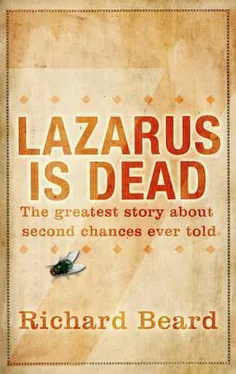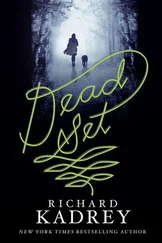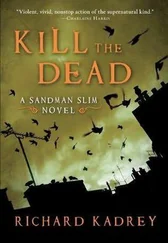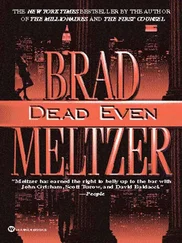‘No one will believe that.’
‘You weren’t as sick as you looked. Lazarus, you did not come back from the dead. I will not allow it. You’ll bring shame on me and my family.’
For the first time Lazarus remembers Saloma, and what a good idea that had seemed, before he died.
‘Leave him alone,’ Martha says, ‘he hasn’t done anything wrong.’
‘He came back to life. Deny it was Jesus and after a decent period all will be forgotten. You can trade again, like before. You can earn some money, marry my daughter.’
‘Can I? I was dead.’
‘Stop it, Lazarus. The Sanhedrin want everything returned to normal. And quickly. You’ve been summoned to reassure them that this will be so.’
‘In Jerusalem?’
‘In Bethany.’
‘As if the high priests would come to Bethany.’
‘They’re already here.’
3
The Bethany synagogue is a single-storey whitewashed building.
Among the seventy-one members of the Sanhedrin are priests who consider the three-mile journey from Jerusalem, most of it uphill, a scandal beyond repair. They console themselves with scriptures, ‘ Dust you are, and to dust you shall return ’ (Genesis 3: 19), and some have rolled extra verses into their tightly strapped phylacteries: ‘ As waters fall from a lake, and a river wastes away and dries up, so mortals lie down and do not rise again ’ (Job 14: 11–12).
If only that were so. Isaiah leads Lazarus into the middle of the synagogue and the priests draw back, making space. The status of the man has yet to be decided. An accidental touch might make them unclean — seven days’ absence from the Temple, and at Passover, too.
Lazarus has the peculiar impression of being unwanted, an intruder at his own trial. Light floods through windows high in the walls. He has an itch on the inside of his knee.
A younger priest, who has come prepared for the smell of the dead, covers his nose with a handkerchief. Others are eager for revelation, and they start shouting all at once:
‘Is there a judgement day?’
‘Are you the messiah?’
‘How did you get food and water into the tomb?’
Their eyes pin Lazarus from every direction, searching for whatever knowledge or power they suppose he has, or for physical scars from his dying.
‘Have you witnessed the kingdom of heaven?’
‘Is it overcrowded?’
‘Are there any animals?’
The priests would like Lazarus to confirm what they already believe.
Lazarus scratches the itch on his knee. Stops. Scratches again. He has been bitten by a mosquito during the night, which seems unnecessary.
‘How wide is the lake of fire that divides the righteous from the wicked?’
‘Are the six hundred and sixty-six angels armed with chains of fire?’
‘Are the angels all the same size ?’
Caiaphas calls for quiet. He is the high priest of Jerusalem and he prefers to avoid theology. The junior priests quieten down. They acknowledge the supremacy of Caiaphas, and his responsibility for making a judgement.
Henry Wadsworth Longfellow, in his verse play Christus: A Mystery (1872), shows Caiaphas deciding the fate of Lazarus: ‘This Lazarus should be taken, and put to death / As an impostor.’
Caiaphas misses Palm Sunday in Jerusalem because he is examining Lazarus at the synagogue in Bethany. As are Joseph of Arimathea and Nicodemus, both of them Jesus sympathisers who are also members of the Sanhedrin. Jesus enters Jerusalem unopposed because the ruling priests are absent. This explains why on that particular day Jesus, surprisingly, has the freedom of the city.
Thanks to Lazarus. Lazarus is the seventh and greatest miracle, a flagrant breach of natural law that has consequences throughout the week that follows.
‘Lazarus came back to life,’ Nicodemus says, pre-empting Caiaphas and appealing for tolerance. ‘Nowhere in the scriptures is resurrection condemned as unlawful.’
‘We have reliable witnesses to Lazarus emerging from his tomb,’ Caiaphas agrees. His voice is measured, almost tired. ‘I don’t wish to dispute this incident. However, I believe it is true that no one saw him die.’
Sadly, it would seem that Lazarus returned from the dead without any easy information. If he had described to the Sanhedrin what death was like, then that would be knowledge we have. We would have had it since the time of Lazarus, and news this important we would not have forgotten.
We do not have that knowledge. We have no idea what to expect from death.
Many recollections of Lazarus express frustration at his failure to communicate. The British laureate Alfred, Lord Tennyson ( In Memoriam , 1849) confronts Lazarus directly: ‘Where went thou, brother, those four days? / There lives no record of reply, / Which telling what it is to die / Had surely added praise to praise.’
Lazarus doesn’t know, or he can’t say. This doesn’t stop the question being asked, and in O’Neill’s Lazarus Laughed a chorus embodies the clamour of competing voices demanding that Lazarus should speak: ‘What is Beyond?’
On Palm Sunday a sceptical crowd reassembles in Bethany hoping for a glimpse of Lazarus. Lazarus, tell us if you can, what is beyond?
And how bad is it for sinners?
Around the edges of the Bethany square, Baruch the assassin slips between shadows. He watches, he waits. The crowd grows with waverers sent by the disciples from Jerusalem — if you don’t believe in Jesus then go and see for yourselves.
Resurrection is the best of miracles. Every single person in Bethany that day can think of someone dead they sincerely wish were alive. Life after death is everything, but of all the dead, they want to ask, why Lazarus? What about us, and our dead?
Baruch remembers the strangers he has killed. What would they say if they came back now? He shakes the thought from his head, and replaces it with practical calculations about when and where. Overnight, Lazarus has become as famous as Jesus. Unless he makes an elementary mistake, he will rarely be alone and vulnerable.
The Sanhedrin Council send Lazarus, escorted by guards, under orders back to his house. The priests are now free to argue amongst themselves.
‘Other than his sisters,’ Caiaphas repeats. ‘Is there anyone credible who can vouch that he died?’
‘The healer left before the end.’
‘There is nothing for us to discuss,’ someone says, in the tone of knowing best. ’Messiahs do not come from the Galilee. And Lazarus can’t have done what they say.’
‘Why should he be different from anyone else?’
Caiaphas tilts his head one way, holds it a second, then tilts it the other. He wants them to appreciate that he has considered this problem from every side, and although judgements other than his are possible, and he respects disparate views, his own opinion, on balance, is probably correct.
‘Yesterday, the Roman governor arrived in Jerusalem from Caesar Maritima. This level of excitement is not what he was hoping to find. However, we can’t dispose of both Jesus and Lazarus. That would be too much.’
‘You’re getting ahead of yourself,’ Nicodemus says. ‘We don’t have power over life and death. Only Rome has that.’
‘I know,’ Caiaphas says. ‘But apparently Lazarus has already died. This is what is being said.’
The Jewish god promises salvation through proper conduct and respect for the priesthood. After thousands of years god is unlikely to change his mind and offer salvation through a man.
‘So which one?’ he asks. With great care he pulls from inside his clothing a large silk handkerchief. ‘The raiser or the raised?’
Caiaphas looks left and right. Nicodemus knows his law. The Sanhedrin can’t sentence anyone to death, but the priests seem slow in understanding his suggestion about Lazarus. Killing a dead man is hardly a crime. He shakes out his handkerchief, and places it elaborately over his nose. He holds it in place, moving only his eyes.
Читать дальше












